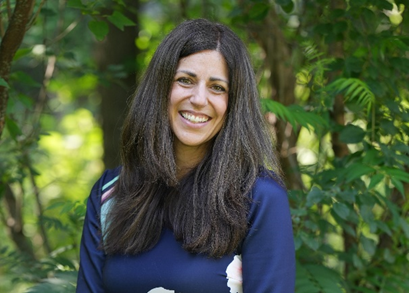In today’s guest blog, Gretchen Nelson, LCSW, is sharing 5 strategies for supporting your ADHD during pregnancy and postpartum. We are excited for you to hear about her perspective, along with strategies that she has found to be helpful!
5 Strategies to Support Your Well-Being
Being a mother with ADHD is like being a hummingbird.
Hummingbirds have the ability to fly in different directions. They are known for having high energy levels and for being erratic and restless. Having wings that are moving faster than other birds, they truly are unique. And in the right conditions and one appears, people are amazed be them.
Living with ADHD while pregnant and transitioning into motherhood can feel like you are working twice as hard and not getting anywhere, like the hummingbird. Now that all your energy is going towards your growing baby, it can be difficult to show up in other areas of your life.
It is not uncommon for women with ADHD to struggle with managing their symptoms during pregnancy and beyond, as the condition can be exacerbated by hormonal changes, stress, and fatigue. However, there are 5 strategies to best support your wellbeing during your transition into motherhood and they are:
- Look to your past
- Find a Support team
- Get an Organizational system
- Sleep, exercise, mindfulness, & nutrition, and
- Know your strengths
Let’s look more closely at each of these.
1. Look To Your Past for Tools to Support Your ADHD During Pregnancy and Postpartum
- PMS/PMDD: It is important to understand how your ADHD symptoms were impacted when you first started your menstrual cycle and if you struggled with Premenstrual Dysphoric Disorder (PMDD) in the past. PMDD disproportionately affects people with Autism and ADHD. Roughly 46% of women with ADHD experience PMDD (additudemag.com). Reflecting on this can help you feel a little bit more prepared for how the surge and changing hormones both during pregnancy and postpartum may impact you.
- Sense of identity: Another area to consider from your past is your sense of identity. What did that transition look like as a teenager when you were forming your sense of self or when you first learned about your ADHD diagnosis?
- Were these times met with low self-esteem?
- Highs or lows or feelings of rage?
- With the transition into motherhood, you are adjusting to another sense of identity. For some women, when their experiences being pregnant or during the postpartum phase were difficult, it lead to a poor sense of self as a mother. Having a low sense of self is associated with increased risks of depression and anxiety.
- Practice self-compassion and seek additional support when needed.
- Managing transitions: A final area to consider from your past is how you managed important transitions in your life.
- How did you cope with other big life transitions?
- Stressful situations?
- When a transition happened, there was likely more involved from an executive functioning standpoint that made life feel even more overwhelming. Therefore, your ADHD triggers and tendencies may have been more heightened. For example, if you were an impulsive shopper, you might find yourself engaging in this behavior more during a big transition.
- Practice self-compassion and seek additional support when needed
Looking to your past with PMDD, sense of self, & how you managed transitions for what was difficult also means you can look to your past for what was helpful.
*Where or how did you find resiliency during those times?
2. Create your support team and seek more help if needed.
The transition into motherhood is considered one of the most vulnerable times in a women’s life and this vulnerability can bring up all different feelings like shame or insecurities. This can be especially true for women with ADHD during pregnancy and postpartum.
- Have a support plan. Who will be part of the plan? What will be involved in the plan, and what is the backup plan to the support plan. Then, share that plan with someone you trust. It is not uncommon for women struggling during the perinatal period to not recognizing how much they might be struggling with their mental health. Being prepared with a plan often is helpful in and of itself.
- While nothing can fully prepare you for what to expect during pregnancy and motherhood, you can expect that some of your “old stuff” will resurface at some point. Knowing how to recognize and name it when it does show up can put that “old stuff” back in its place.
- Some women with ADHD experience an increase in sensory and emotional sensitivity. Knowing when this is happening for you can help you know ways you can support yourself.
*Know your limits, set boundaries, ask for help, be kind to yourself, and practice your self-care strategies.

3. A home organizational system
The baby “to do” lists and extra executive functioning needed to care for a newborn can be extremely overwhelming. If you’ve struggled with wasting time looking for items before having a baby, it is important to focus on areas to make life easier(e.g., finding a location you will always put your keys).
When your home environment feels more organized, internally you will also feel more organized. This will help reduce stress, anxiety, and sense of overwhelm.
*Breakdown tasks and invite a friend over who loves organization to support your home environment
4. Sleep, Exercise, Nutrition, Mindfulness are Key for Supporting ADHD During Pregnancy and Postpartum
What is good for everyone is GREAT for your Baby and especially for supporting women ADHD during pregnancy and postpartum.
- These 4 things can make a HUGE impact on mood and ADHD symptoms. They really do make a difference and can’t be stressed enough. A lot of women with ADHD talk about struggling with motivation during pregnancy so keep it simple for yourself! Even if it’s going for a walk 10 minutes a day, it is better than nothing and can still have a positive impact.
- Try Pre-natal yoga for a two-for-one. You can combine mindfulness and exercise at the same time. The movements can help to reduce discomfort during pregnancy, and there are so many benefits of being around other pregnant woman. It’s a win-win.
- Track your symptoms in a journal during pregnancy and post baby.
- Poor sleep is often something that can trigger your negative self-talk, which can create a downward spiral. For instance, we tend to eat more sweet and salty foods when we are feeling tired and down. This can cause us to then feel sluggish and less likely to workout. It can be difficult to break out of that cycle.
- Another consideration is that your body may respond differently to foods during and after pregnancy. If you are experiencing changes to your sleep, digestion, or mood, consider meeting with your doctor.
*Recommendation* Track your symptoms in a journal during pregnancy and post-baby.
5. Name your strengths!
Now come the strengths of the hummingbird and the mother with ADHD.
I saved the best for last! By knowing your strengths, you can support your wellbeing during your transition into motherhood. You may not realize it, but you already have amazing strengths that make up your amazing, individual self! You can create an environment that helps you shine.
- List all your strengths and post it up on your bathroom mirror to see every morning!
- Here are just a few of the top strengths I see in moms with ADHD:
- Creativity (play ideas)
- Empathy (understanding & sensitivity)
- Intuition (knowing when something is off)
- Spunk and sense of fun to dance, paint, sing, and laugh (great for development)
- Being in the here and now and that is exactly where your little needs you to be.
Motherhood can come with all sorts of challenges, and as a mom with ADHD you might not do things like all the other mothers, but you are exactly the mother your little one needs you to be!
Looking For More Help for ADHD During Pregnancy and Postpartum?
As the old saying goes, it takes a village to raise a child. Well, I say it takes a whole community to support motherhood. If you would like to become part of a compassionate and supportive community for women with ADHD who are also in the transition phase of motherhood, please visit www.parent-childbond.com for more details or email me at gretchen@parent-childbond.com

Having ADHD myself and being a mother, I know all the ways our ADHD can make managing the changing hormones, sleep deprivation, and extra demands during the transition into motherhood more difficult at times. What’s more is there is often a lack of expertise in how to specifically support moms who have ADHD during this time of transition. As a licensed mental health therapist and owner of parent-child bond, I want to bridge that gap. I coach and support moms with ADHD during their transition into motherhood so that they can be the best version of themselves that they want to be. I hold certifications in ADHD and Perinatal Mental health with specialty training in Trauma using EMDR through a perinatal and infant-toddler mental health lens.
Thank you, Gretchen, for sharing all of this insight with our readers about supporting moms with ADHD during pregnancy and postpartum!
Have a beautiful week,
Lori, Katie, and Mallory







+ show Comments
- Hide Comments
add a comment